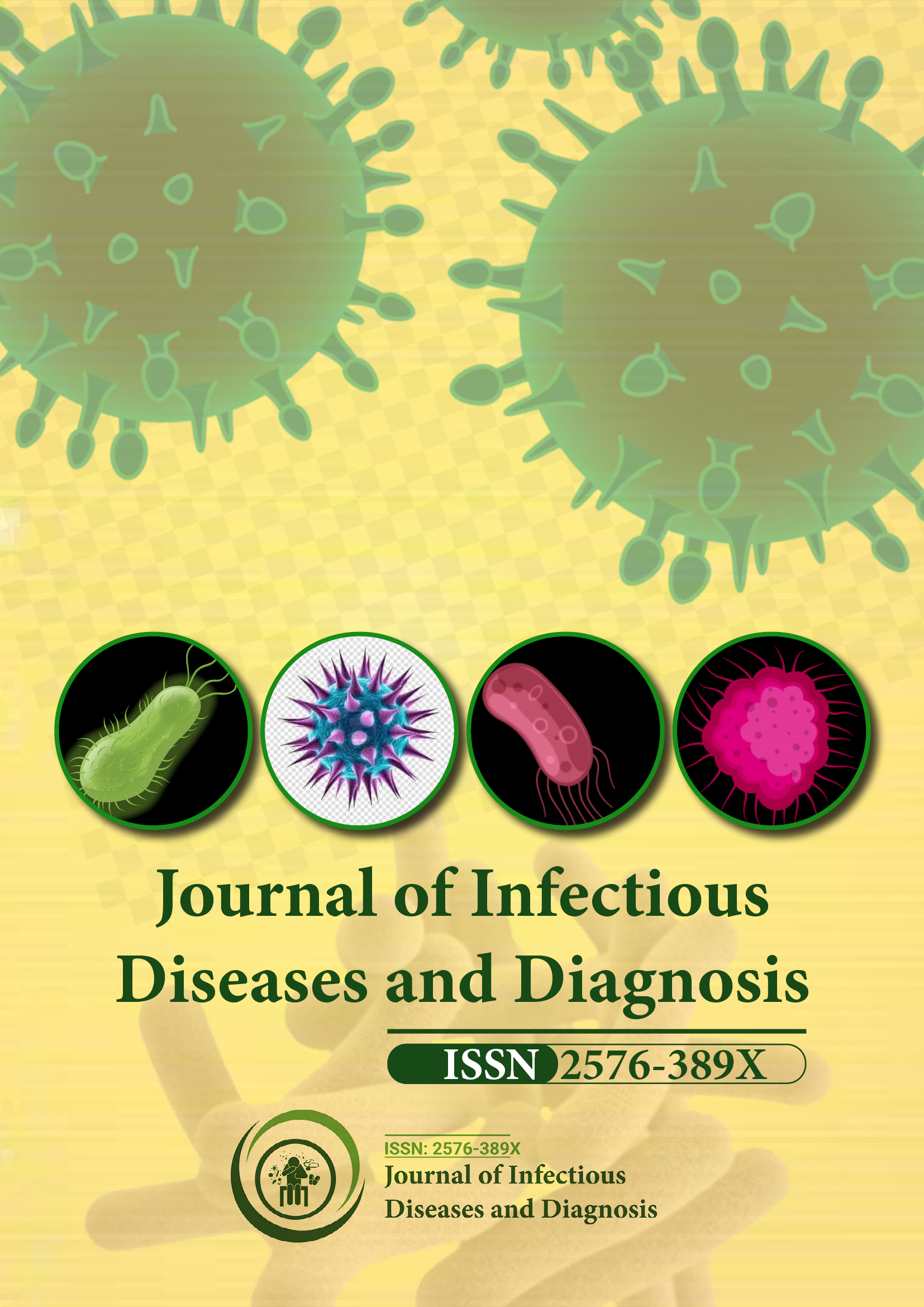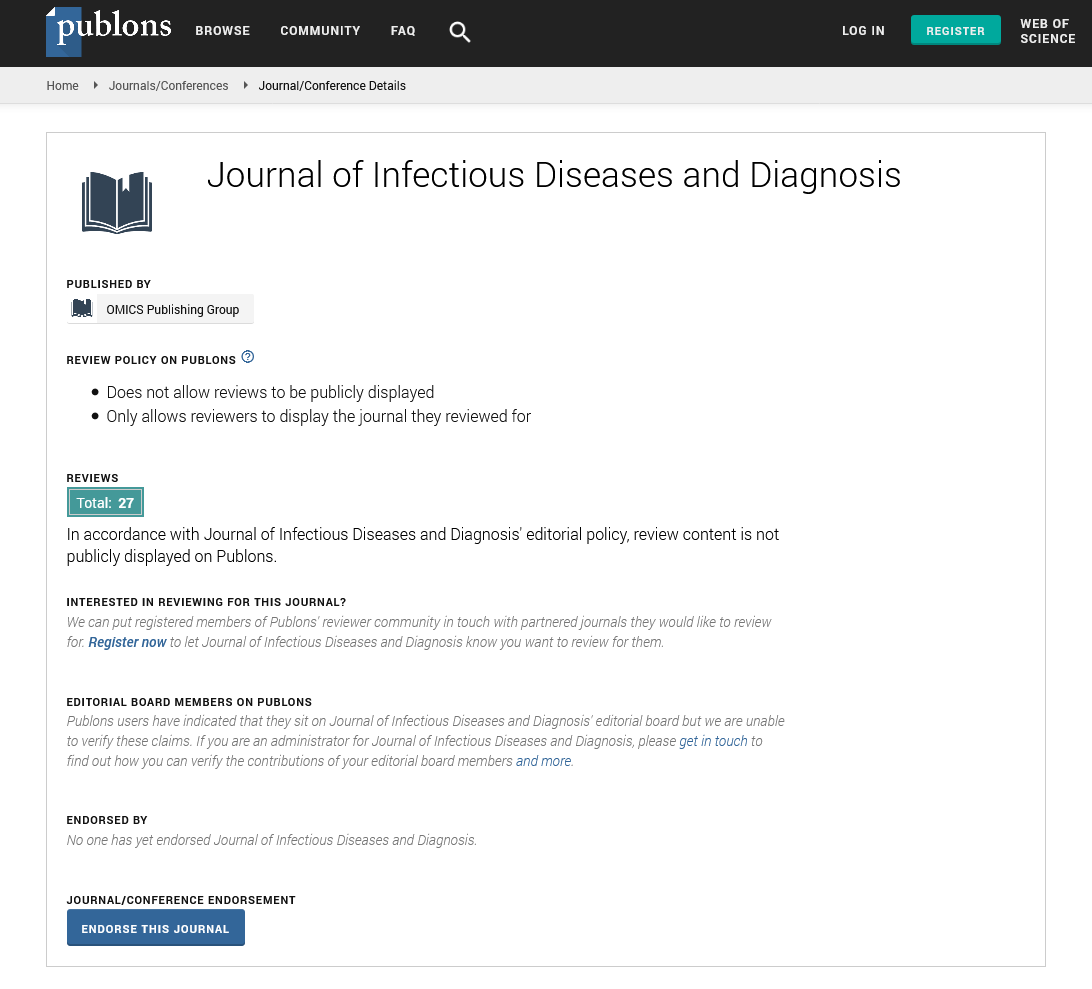Indexed In
- RefSeek
- Hamdard University
- EBSCO A-Z
- Publons
- Euro Pub
- Google Scholar
Useful Links
Share This Page
Journal Flyer

Open Access Journals
- Agri and Aquaculture
- Biochemistry
- Bioinformatics & Systems Biology
- Business & Management
- Chemistry
- Clinical Sciences
- Engineering
- Food & Nutrition
- General Science
- Genetics & Molecular Biology
- Immunology & Microbiology
- Medical Sciences
- Neuroscience & Psychology
- Nursing & Health Care
- Pharmaceutical Sciences
Commentary - (2023) Volume 8, Issue 6
Strain-Specific Immunomodulation in Leishmania major Infection: Insights into Pathogenesis
Felipe Lemos*Received: 02-Oct-2023, Manuscript No. JIDD-23-24038; Editor assigned: 04-Oct-2023, Pre QC No. JIDD-23-24038 (PQ); Reviewed: 20-Oct-2023, QC No. JIDD-23-24038; Revised: 27-Oct-2023, Manuscript No. JIDD-23-24038 (R); Published: 03-Nov-2023, DOI: 10.35248/2576-389X.23.08.243
About the Study
Leishmaniasis, a neglected tropical disease caused by the protozoan parasite Leishmania, poses a significant global health threat. Within the Leishmania genus, Leishmania major is a causative agent of cutaneous leishmaniasis, a debilitating disease affecting millions of individuals worldwide. Recent research has examined into the intricate relationship between host immune responses, particularly lymphocytes, and the pathogenesis of Leishmania major. This study explores the variation of the strain- dependent interplay between lymphocytes and Leishmania major, elucidate on how the variability in parasite strains influences the host immune response and disease outcomes.
The complex landscape of Leishmania major pathogenesis
Leishmania major exhibits remarkable genetic diversity, leading to distinct strains with varying degrees of virulence and immunogenicity. This diversity complicates the understanding of host-parasite interactions and disease progression. The pathogenesis of Leishmania major is intricately linked to the host's immune response, with lymphocytes playing a pivotal role in orchestrating defense mechanisms against the invading parasite. However, the strain-dependent nature of this interplay introduces a layer of complexity that demands closer scrutiny.
Lymphocytes as key players in host defense
Lymphocytes, including T cells and B cells, are central components of the adaptive immune system and play a crucial role in combating intracellular pathogens like Leishmania major. T cells, especially CD4+ and CD8+ T cells are essential for coordinating an effective immune response by producing cytokines, activating macrophages, and directly killing infected cells. B cells contribute to the immune defense by producing antibodies that can neutralize parasites and enhance phagocytosis.
Strain-dependent variability in parasite virulence
One of the intersting aspects of Leishmania major pathogenesis is the variability in virulence among different strains. Some strains are associated with mild, self-limiting disease, while others lead to severe, disseminated infections. The reasons behind this strain-dependent virulence remain elusive but are thought to involve genetic factors influencing parasite evasion strategies and the host immune response.
Strain-specific immune evasion mechanisms
Certain Leishmania major strains have evolved distinct mechanisms to evade the host immune system, further complicating the strain-dependent interplay with lymphocytes. These evasion strategies may include the modulation of antigen presentation, interference with cytokine signaling, and the induction of regulatory T cells. Understanding these strain- specific immune evasion mechanisms is significant for developing targeted therapeutic interventions.
Immunomodulation by lymphocytes: A double-edged sword
While lymphocytes are essential for orchestrating an effective immune response, their activity can also be exploited by Leishmania major for survival and propagation. The strain- dependent modulation of lymphocyte function adds another layer of complexity to this delicate balance. Some strains may trigger a robust and protective immune response, while others could subvert lymphocyte function, allowing the parasite to establish persistent infections.
Implications for vaccine development
The strain-dependent interplay between lymphocytes and Leishmania major has profound implications for vaccine development. A successful vaccine must consider the genetic diversity of parasite strains and elicit a broad and robust immune response capable of providing protection against multiple strains.
The identification of conserved antigens that induce protective immune responses across different strains is a key challenge in the quest for an effective leishmaniasis vaccine.
Future directions and challenges
As research continues to clear up the complexities of the strain- dependent interplay between lymphocytes and Leishmania major, several challenges and avenues for future exploration emerge. The development of advanced genomic and immunological tools will aid in dissecting the genetic determinants of strain-specific virulence and immune evasion. Additionally, collaborative efforts across research institutions and regions will be essential to capture the diversity of Leishmania major strains circulating in different endemic areas.
Conclusion
The strain-dependent interplay between lymphocytes and Leishmania major in pathogenesis represents a captivating area of research with far-reaching implications for our understanding of leishmaniasis. Deciphering the genetic and immunological factors that underlie strain-specific variations in virulence and immune evasion is crucial for the development of effective therapeutic strategies and vaccines. As the scientific community continues to unravel the complexities of this intricate relationship, we move one step closer to mitigating the global burden of cutaneous leishmaniasis and advancing the field of infectious disease research.
Citation: Lemos F (2023) Strain-Specific Immunomodulation in Leishmania major Infection: Insights into Pathogenesis. J Infect Dis Diagn. 8:243.
Copyright: © 2023 Lemos F. This is an open-access article distributed under the terms of the Creative Commons Attribution License, which permits unrestricted use, distribution, and reproduction in any medium, provided the original author and source are credited.

